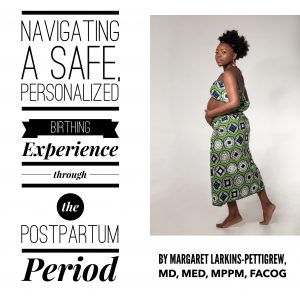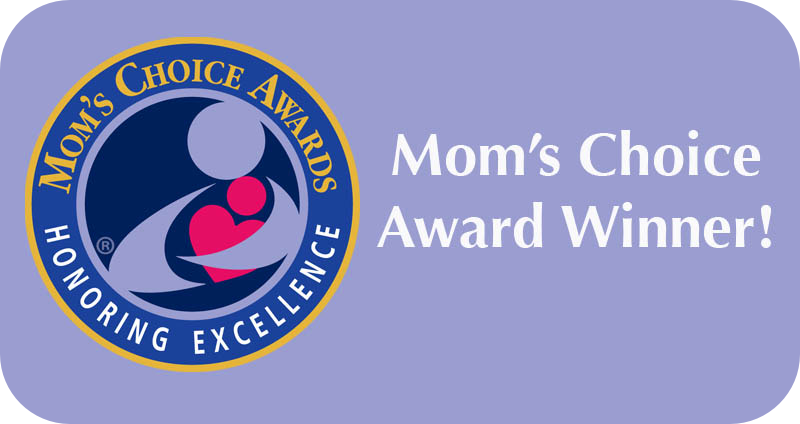Navigating a Safe Personalized Birthing Experience through the Postpartum Period
By Margaret Larkins-Pettigrew, MD, MEd, MPPM, FACOG

The pregnancy experience begins prior to actual implantation of the ovum which starts the wonderful creation of a living and breathing human being in a matter of nine months. This miracle is not without stressors that are unpredictable and may add to the joyful anticipation of a newborn.
There are several recommendations to minimize these stressors but the five top strategies that will assist in making this experience a safe and personalized one includes 1) intentional investment in the pre-natal period 2)understand the pregnancy course including risks and benefits 3) secure a clinician who will act as a medical partner in decision making & include a doula or community health worker who will act as an additional knowledgeable support person 4) engage in a centering health program (in-person or virtually) 5) continue utilization of support individuals and services for a minimum of one year after giving birth.

1) Intentional investment in the pre-natal period
Pregnancy is described as a normal physiological process that exerts significant abnormal stressors on a women’s body as she supplies protection and needed nutrients to her unborn child. The pre-natal period is the most optimal time to become familiar with the birthing process while preparing your body, mind, soul and family for this planned event. This requires more than pre-natal vitamins, physical wellness and gathering needed genetic information. The decision focused on timing is key. In 2021, pregnancy is a choice. Very few individuals get pregnant by the ‘oops” method. The options of safe birth control methods are endless and the myths that surround “I didn’t think I could get pregnant “are now buried in old history books. So now that we agree that pregnancy is a choice, let’s agree that pregnancy requires preparation that includes the future mothers’ psychological/emotional and social wellness.
Much has been written concerning the mothers psychological wellness which often fully manifests itself in the postpartum period but can be a constant challenge during pregnancy. Mental wellness is essential to be prepared for the pregnancy. Mood swings and previous history of mental illness many be exacerbated during pregnancy. It is important to seek and maintain mental health management and support prior to pregnancy.

2) Understand the pregnancy course including risks and benefits
Regular and scheduled pre-natal visits are key to a successful pregnancy. Although pregnancy is considered a normal process, entering this phase of the journey of motherhood must be approached with a broad foundation of knowledge of both the risks and benefits. Morning sickness, back pain, constipation and mood swings are many of the complaints echoed by pregnant women. These are normal discomforts that the changes and fluctuations of hormones bring to this experience. These hormonal changes also give women protection against the development of ovarian and breast cancer. Intimacy, sex and orgasms are more enjoyable as well. In addition to giving the developing baby nutrition, moms drop bad habits and take better care of their bodies. These are many of the expected changes but there are other risks that are important to understand. Pre-term labor, pre-term delivery, hypertensive disease, pre- eclampsia and diabetes are common complications of pregnancy. During labor and delivery the risk of cesarean delivery, intrapartum and postpartum hemorrhage and anesthesia complications are potential risks that should be discussed by your provider.

3) Secure a clinician who will act as a medical partner in decision making & include a doula or community health worker who will act as an additional knowledgeable support person
The care that women receive prior to, during and after the birth of a child will limit the anxiety that normally accompanies this anticipation. Selecting this caregiver is one of the most important decision a mother can make. A partnership with a clinician that will listen, advise and always treat a mother with dignity and respect is never to be compromised. Including a doula or community health worker will be a valuable asset to any mother. These individuals give mothers an added layer of protection by understanding the cultural, socioeconomic and political strengths and weaknesses of their communities. Doulas give women a voice when they are fearful, in pain and too weak to use their own voices. They bring comfort to the entire family. Developing a birth plan that is safe, evidenced based and reflects a mothers’ wishes can be a developed jointly with her clinical team.

4) Engage in a centering health program (in-Person or virtually)
The Centering pregnancy model has demonstrated that group care has resulted in better pregnancy outcomes for mothers and babies. Bringing women together to perform risk assessments, educate them to know how to practice self-care and give support as part of wrap around clinical care. This method of pregnancy care brings patients out of the exam room into a unique group. The psychology of this care model is focused on decreasing stress and anxiety through meditation, mindfulness, yoga and dance.

5) Continue utilization of support individuals and services for a minimum of one year after giving birth
The post-partum period may sometimes be the most stressful time of the pregnancy journey. This is the period that traditionally extends through six weeks after delivery. It has been demonstrated that women need more support well beyond six weeks. This is especially a critical period for under-resourced mothers who find it more challenging to find needed support for this period. A new born is demanding and mothers return home to continue mothering with a body and mind that have been drained. The birthing experience requires a tremendous amount of energy. Lack of sleep in conjunction with the demands of a newborn can lead to significant stress, anxiety and depression. Support from family and friends who can assist in helping mothers through this period is critical. In addition, mothers need pampering as well. I recommend starting a new tradition. A mother shower! Shower her with perfumes, lingerie and cosmetics that remind her that she is a beautiful women. A beautiful mother!
AUTHOR:
 Margaret Larkins-Pettigrew, MD, MEd, MPPM, FACOG
Margaret Larkins-Pettigrew, MD, MEd, MPPM, FACOG
SVP, Chief Clinical Diversity, Equity & Inclusion Officer
Enterprise Health Equity Institute
Professor/Obstetrics and Gynecology
120 Fifth Avenue
Fifth Avenue Place, Suite 2900
Mail Code: FAPHMK 292E
Pittsburgh, PA 15222
Executive Assistant: Nicole.Woods@ahn.org
EA Phone: 412-330-2437
Disclaimer: The views and opinions expressed in this article are those of the authors and do not (necessarily) reflect the views of PregnancyJournal.com. PregnancyJournal.com can in no way whatsoever be held responsible for the content of such views nor can it be held liable for any direct or indirect damage that may arise from such views.




